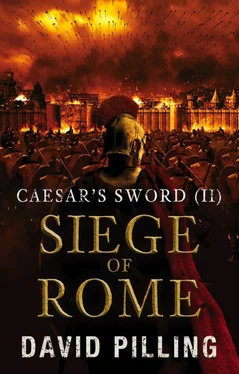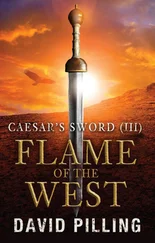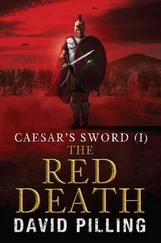David Pilling - Siege of Rome
Здесь есть возможность читать онлайн «David Pilling - Siege of Rome» весь текст электронной книги совершенно бесплатно (целиком полную версию без сокращений). В некоторых случаях можно слушать аудио, скачать через торрент в формате fb2 и присутствует краткое содержание. Год выпуска: 2013, Жанр: Исторические приключения, на английском языке. Описание произведения, (предисловие) а так же отзывы посетителей доступны на портале библиотеки ЛибКат.
- Название:Siege of Rome
- Автор:
- Жанр:
- Год:2013
- ISBN:нет данных
- Рейтинг книги:3 / 5. Голосов: 1
-
Избранное:Добавить в избранное
- Отзывы:
-
Ваша оценка:
- 60
- 1
- 2
- 3
- 4
- 5
Siege of Rome: краткое содержание, описание и аннотация
Предлагаем к чтению аннотацию, описание, краткое содержание или предисловие (зависит от того, что написал сам автор книги «Siege of Rome»). Если вы не нашли необходимую информацию о книге — напишите в комментариях, мы постараемся отыскать её.
Siege of Rome — читать онлайн бесплатно полную книгу (весь текст) целиком
Ниже представлен текст книги, разбитый по страницам. Система сохранения места последней прочитанной страницы, позволяет с удобством читать онлайн бесплатно книгу «Siege of Rome», без необходимости каждый раз заново искать на чём Вы остановились. Поставьте закладку, и сможете в любой момент перейти на страницу, на которой закончили чтение.
Интервал:
Закладка:
I wiped my eyes with the back of my hand, just as the shrieking wind tore away the veil of dust and sand before us. At last I could see the rebel infantry, or what was left of it. Belisarius’ wild storm-charge had smashed great holes in their ranks, sweeping away squadrons and littering the ground with broken and mutilated bodies.
Many of the ill-armed levies had fled the field, but a few stubborn mutineers and Vandals remained, formed up in isolated groups around their standards. Our cavalry swirled around them, casting spears and javelins in their faces. Belisarius’ guards were trained to use the short bow while mounted, and thumbed arrows into the helpless rebels. They would die where they stood, these men, or face the agony of crucifixion as a just punishment for those who betrayed the Roman state.
I turned my horse away, thinking to take a breath of air and some water from my pottle. Now the brief battle was all but won, there was no need to take undue risks. Our men would whittle away at the rebels until their ragged shield-walls broke and we could charge in for the final slaughter.
My horse carried me clear of the stench and din of battle, until I found a relatively quiet spot. The wind was still churning up sand-devils and blowing clouds of dust across the plain, so I felt strangely alone, shielded from the slaughter happening not more than thirty feet away.
I had forgotten about Photius. He might have killed me then, but was unable to restrain himself from letting out a cry as he raced in to cut me down from behind.
My water pottle was halfway to my lips when I heard the cry. I dropped it and hurled myself out of the saddle. His spatha sliced through thin air as I crashed onto my side, painfully jarring my recently healed arm.
“Pig!” I heard Photius snarl. He galloped past and wrenched his horse around for another tilt at me. I glimpsed the young man’s face under his helmet, his handsome features contorted almost beyond recognition with berserk fury.
Some instinct made me glance to my left. Another horseman was coming at me, one of my comrades from the First, his kontos lowered at my breast.
The ground shook under my feet as he charged. Somehow my nerve held. Instead of panicking I held my ground and watched that gleaming lance-tip streak towards me. At the very last second I dived to my left.
Death missed me by inches. I hit the ground hard, staggered to my feet, spitting dirt, and turned to face where I imagined Photius was.
Too late. He was on me like an avenging angel, spatha raised to strike. I had no time to lift my little shield or ward off his blow with Caledfwlch.
His blade crashed against the side of my helmet. Searing pain filled my skull. I tasted blood in my mouth. The world vanished, replaced by darkness and flashing lights.
Then there was nothing.
7.
I must have lain unconscious for several hours. When I woke, night was slanting across the battlefield, and the thumping pain in my head was as nothing to the stench of death in my nostrils.
Happily, Photius was not half the swordsman he thought he was. His blow had sheared the side-flap from my helmet, and scored a nasty gash on my head, but failed to split the bone. It was enough to knock me out cold, and fool him into leaving me for dead, but I suffered no other damage save a headache and loss of blood.
I peeled off the crumpled shell of my helmet and struggled into a kneeling position, groaning and carefully exploring the wound on my head. The bleeding had stopped, and the right side of my skull was covered in a layer of half-dried, congealed gore.
There was no sign of our army. The freak storm had died down, and I was able to see the hundreds of bodies, men and horses, that carpeted the plain. Most of them were rebels. Belisarius had smashed Stoza’s host and moved on, either pursuing them into the deep desert or withdrawing to Carthage. I briefly felt bitter that he had left me behind, but that was naive: victory came first, and Belisarius could not afford to be sentimental.
The feeble groans of the dying echoed across the field as I got to my feet. My head swam, and I swayed dangerously, like a new-born calf attempting to stand.
My hand instinctively went to my hip, searching for the reassuring touch of ivory. The scabbard was empty. Gulping in panic, I glanced down and spotted the sword lying near where I had fallen. It seemed Photius was ignorant of the legend of Caesar’s sword, and had not thought to take it.
Other voices reached my ears as I bent to pick up Caledfwlch. The moans of dying men were mingled with the shrill yelps of desert hyenas, prowling among the bodies and fighting each other for strips of carrion. Some of the vile beasts tore at the bodies of men that yet lived. I saw a few vultures flapping about, their great leathery wings lending them the appearance of witches.
Their human counterparts were at work. Some of the braver or more desperate citizens of Membresa had ventured out of the city, carrying knives and cudgels. Now the fighting was over, it was time to plunder the dead as some recompense for being robbed by Belisarius.
I had witnessed the aftermath of battles before, but never from a position of danger. If I didn’t get off the field and find somewhere to hide until dawn, I would end up with a slashed throat, and Caledfwlch would fall into peasant hands.
My wound made me sluggish. I had scarcely begun to limp away when a high-pitched, nasally voice cried out somewhere behind me:
“There is one of them! Bring him down!”
I broke into a staggering run. More voices piped up, like a flock of excited crows descending on a kill.
A number of thin, wiry figures in loose grey robes suddenly appeared before me, as though they had sprouted out of the ground. They were peasants, their seamed, leathery faces twisted into bestial snarls, gnarled hands gripping sickles and pitchforks and other makeshift weapons.
I fell into a guard position, holding Caledwlch ready to stab at any that came too near. The peasants were not dissuaded, and slowly closed in around me.
“This one has some fire left in him,” one grunted, “bring him down with your spear, Sama.”
The vinegar-faced brute named Sama drew back his arm and left fly. Fortunately, he was a handless buffoon, and the sharpened stick that he called a spear flew harmlessly over my head.
I swallowed and moistened my dry lips, cudgeling my brain for something to say. “I am a Roman officer,” I croaked, unable to think of anything better, “if you harm me, Rome will have her vengeance. Let me go, and you shall be rewarded.”
Months later, when I repeated this little speech to Procopius, he laughed until the tears flowed down his cheeks.
“Poor Coel,” he chuckled, dabbing at his eyes, “your continued survival is proof that God has a certain dry wit.”
He was right, damn him. I should have spared my breath. Staying strong and silent might have made the peasants hesitate, but now they knew I was desperate. And scared.
“Take him!” cried one who seemed to be their leader, a round-shouldered man with a greasy tangle of beard poking from under the scarf that hid the lower part of his face. He had a certain authority, and his robe and fringed mantle were made of finer stuff than the coarse wool of his fellows.
He was also no fool, and hung back while the others rushed me all at once. There were seven of them, too many to repel even I had been fit.
I had no option but to try. A man wielding a pitchfork came screaming at me, jabbing the prongs at my face. I batted the clumsy weapon away and sheared the skin off his knuckles, making him drop the fork and howl in agony.
A flat-headed wooden club cracked against my shoulder. Once again my armour saved me. I swung around to stab at the clubman, and someone grabbed my hair from behind. That was futile, since it was shorn to a smear of stubble, Roman military style. I jerked my head backwards and connected sharply with a jaw.
Читать дальшеИнтервал:
Закладка:
Похожие книги на «Siege of Rome»
Представляем Вашему вниманию похожие книги на «Siege of Rome» списком для выбора. Мы отобрали схожую по названию и смыслу литературу в надежде предоставить читателям больше вариантов отыскать новые, интересные, ещё непрочитанные произведения.
Обсуждение, отзывы о книге «Siege of Rome» и просто собственные мнения читателей. Оставьте ваши комментарии, напишите, что Вы думаете о произведении, его смысле или главных героях. Укажите что конкретно понравилось, а что нет, и почему Вы так считаете.












